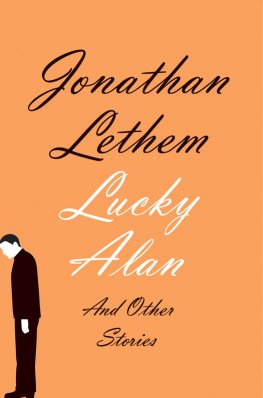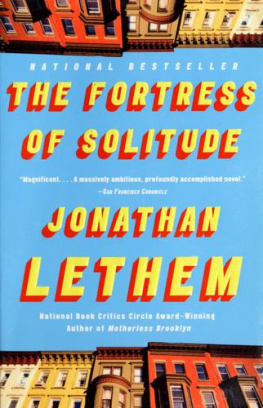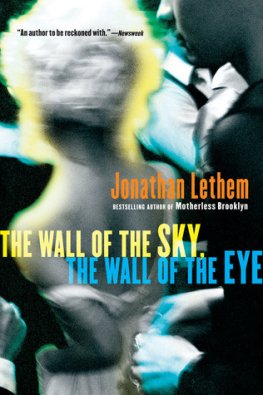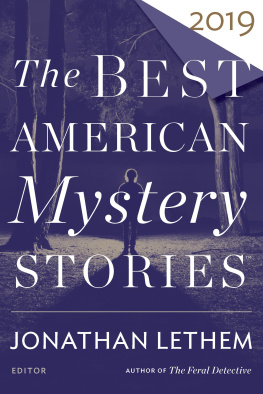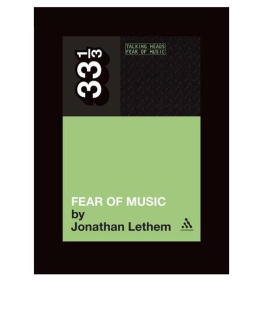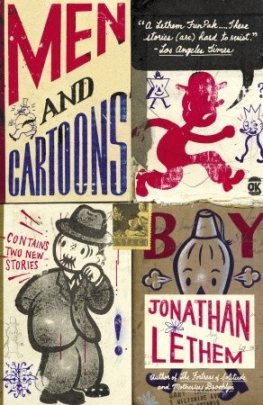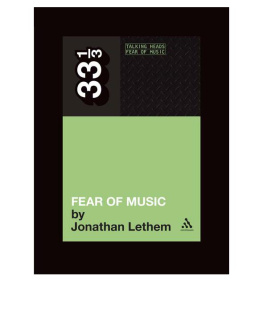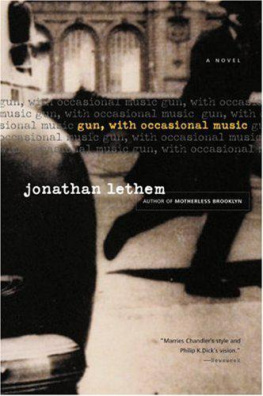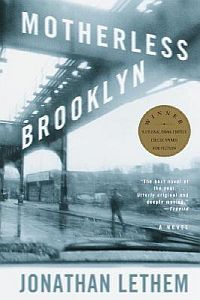Jonathan Lethem
Lucky Alan: And Other Stories
In the months after Id auditioned for him, I would run into the legendary theater director Sigismund Blondy at the movies, near-empty Thursday matinees of indifferent first-run filmsNorth Country, Wedding Crashersin the decaying venues of the Upper East Side, where we both lived: the Crown, the Clearview, the Gemini; big rooms chopped into asymmetric halves or quartered through the balcony. Blondy saw a movie every afternoon, he said, and could provide scrupulous evaluations of any title youd ever think to mention largely dismissals, though I do recall his solemn approval of A Sound of Thunder, a time-travel film with a Ben Kingsley performance hed liked. Id see Blondy when the lights came up alone, red scarf and pale elegant coat unfurled on the seat beside him, long legs crossed unashamed, already hailing me if he spotted me first. Blondy dressed in dun and pastel colors, wore corduroys or a dancers Indian pants; in winter he had holes in his knitted gloves, in summer a cheesy Panama hat. He towered, moved softly and suddenly, usually vanished at any risk of being introduced. Soon Id scan for Blondy whenever I entered a theater, alone or not. Often enough Id find him. We never sat together.
If this multiplex-haunting practice didnt square with Blondys reputation as the venerated maestro of a certain form of miniaturist spectacle (Krapps Last Tape in the elevator of a prewar office building, which moved up and down throughout the performance, with Blondy himself as Krapp, for cramped audiences of five or six at a time), it didnt matter, since that reputation hardly thrived. Id auditioned talked with him, really for a role in a repertory production of several of Kenneth Kochs One Thousand Avant-Garde Plays. Dianne Wiest sat with us in the back room of the SoHo Italian restaurant in which the Koch cycle was to be staged, and where this evaluative tte- -tte took place. She followed our conversation soberly, her unexplained presence typical of Blondys Zelig-like infiltration of the citys culture. Within weeks Id learned that Blondyd had a falling-out with the restaurants proprietor, stranding the enterprise. Id waited, expecting some revival of the project, for months. Eventually I assumed Id been replaced and kept half an eye on the Times for a notice of the thing. But the Koch never surfaced, nor did anything else. Maybe Blondys run was over. Or on hiatus in some deep ruminative lag. And then, in the months that followed, he gradually became my moviegoing doppelgnger.
The ritual was made official the first time he invited me out for a glass of red after the movie, as though that were the real point of the afternoon. Wed sit at some Madison or Second Avenue wine bar in the dimming hours, invariably alongside those waiting for their dinner dates, those who made even me feel old. Whether Blondy ever felt old I couldnt guess. His grandiosity, his U-turn anecdotes, his contempt for the obvious statement didnt invite such guesses, only the tribute of gratified awe. I gave it. Blondy was like a skater up his own river, a frozen ribbon the rest of us might have glimpsed through trees, from within a rink where we circled to tinny music. The first time we left a movie theater together, before even finishing a glass, I told him I had quit acting. Blondys intimate smile seemed to say, not unsympathetically, that it was all for the best. We rarely talked about the film wed just seen; instead we discussed great works the Rothko retrospective, Fassbinders Berlin Alexanderplatz, Durrells Alexandria Quartet, whatever formed his present obsession. After two or three glasses on an empty belly had made me dizzy Blondy never showed any effects wed part on the sidewalk.
By the time it occurred to me that I hadnt seen Sigismund Blondy in a while, I couldnt have said how long a while was. Four months? Eight? It seemed to me hed been in holey-gloves-and-red-scarf mode the last time wed slipped from a theater to a bar, but that didnt narrow it down much. We were headed back to scarf weather now. Maybe Blondy had summered somewhere Provincetown? and decided not to return, enlisting some local company to mount spectacles in a dockworkers bar or a bowling alleys lounge. Sig Blondy, big fish in a small pond? I knew no more consummate New Yorker, so I started to worry.
Neither of the two people whom Blondy and I knew in common had any reason to know that the director and I spent afternoons together, but when I called the first didnt have Blondys phone number, and the second had one that he thought was the old number, then found another he recommended I try neither was interested enough to ask why I wanted to track him down. Perhaps these days Blondy was less well remembered than Id assumed. Blondy, likely in his early sixties, always seemed to me terrifyingly vital, but those in their early sixties might suddenly fail. Had I entered, without noticing, some quiet bargain struck among the proud bachelors of Manhattan to get one anothers backs? In my rapidly evolving fantasy, Blondy became pitiable, myself a rescuer. I rang the number. Blondys machine was set to pick up on the first ring. It figured hed be an old-school screener.
Grahame, he said, interrupting my message. His tone was munificent, as if congratulating me for having the name I did.
Id been reaching for words to distill my concern but now scrambled, defensively, for a joke. His relish at having lifted the receiver in the thick of my fumbling seemed akin to his pleasure at our old, ambiguous encounters in theater lobbies, before wed begun drinking. What I said now was Dont you go to the flicks anymore, or are you ashamed to take the senior discount?
Oh, I go. Every afternoon. Just not in the old neigh-bore-hood.
I miss you, I blurted.
He explained that hed moved downtown, to Minetta Street. Hiding in plain sight, he called it. Hed spoken in the past of his devotion to the block of Seventy-eighth Street, where for decades hed held down a rent-stabilized bargain, and of his persistent enchantment with the tribes of dog-walkers and nannies hed mingled with there, once calling the Upper East Side the last of the true Manhattan. But I didnt get a chance to ask him why hed abandoned it. Ive got some questions I want to ask you, he said. When can you get here?
Questions?
Better than questions, a questionnaire. Youll see.
You want me to come to Minetta Street? Today?
Look, Film Forum is doing MizoguchiUgetsu. Ever seen it? There was something of the director in his bullying and beguiling, but it was in my nature, I suppose, to be directed.
*
Ugetsu astonished me. Discussing it after the two-fifteen matinee, while we looked on Sixth Avenue for a restaurant with a suitable bar, Blondy said that for years hed felt that two scenes toward the end of the film were reversed from their ideal order the only flaw, hed always thought, in a perfect work of art but that today, sitting at Film Forum, waiting for it, he couldnt spot the flaw hed earlier been so certain of. Whats pathetic is that Id presumed to go around all these years sure I knew better than Mizoguchi! Its as though I had to defend myself against the films perfection. I was awed, as I maybe was supposed to be, at the scrupulousness with which he dwelled on what he cared for. Perhaps I was also awed at the change in our friendship. Wed gone to a movie that Blondy cared about, instead of trash, and for once wed sat together in the theater, so I could smell Blondys faint but unmistakable doggish odor. It felt as though Id stepped into Blondys script, was now simultaneously the featured performer and the sole audience for the most infinitesimal of his productions.

